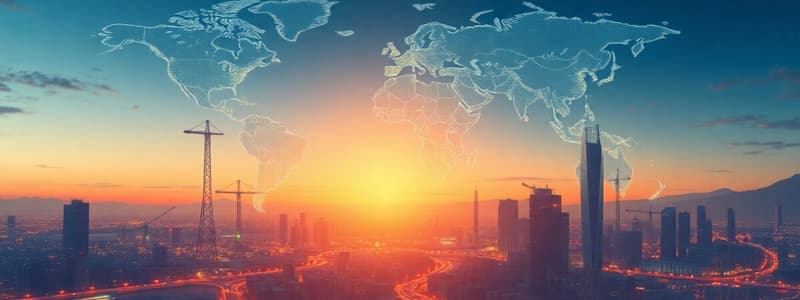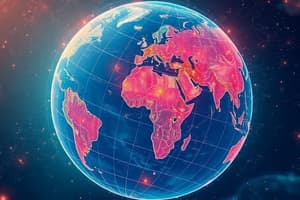Podcast
Questions and Answers
Which characteristic distinguishes multinational corporations (MNCs) from domestic companies?
Which characteristic distinguishes multinational corporations (MNCs) from domestic companies?
- They are always larger in terms of revenue.
- They operate solely within their country of origin.
- They primarily focus on local markets only.
- They have business operations in more than one country. (correct)
What factor contributes to the diversity observed among multinational corporations (MNCs)?
What factor contributes to the diversity observed among multinational corporations (MNCs)?
- Similarities in control and ownership patterns.
- Standardization of overseas business relative to total business.
- Differences in size and country of origin. (correct)
- Uniformity in organizational structure.
What is a key factor driving the increasing trend of companies becoming multinational corporations (MNCs)?
What is a key factor driving the increasing trend of companies becoming multinational corporations (MNCs)?
- To limit their operational footprint to a single country.
- To reduce their exposure to overseas market risks.
- To standardize production processes across all locations.
- To gain low-cost access to local markets. (correct)
What defines Foreign Direct Investment (FDI)?
What defines Foreign Direct Investment (FDI)?
During which phase of the product life cycle is a multinational corporation (MNC) most likely to shift production abroad to maintain cost competitiveness?
During which phase of the product life cycle is a multinational corporation (MNC) most likely to shift production abroad to maintain cost competitiveness?
What is a potential disadvantage for a host country when it comes to multinational corporation (MNC) investment?
What is a potential disadvantage for a host country when it comes to multinational corporation (MNC) investment?
What is a primary challenge multinational corporations (MNCs) face when implementing a global strategy?
What is a primary challenge multinational corporations (MNCs) face when implementing a global strategy?
Which factor would most likely encourage a multinational corporation (MNC) to expand into a new foreign market?
Which factor would most likely encourage a multinational corporation (MNC) to expand into a new foreign market?
How does Foreign Direct Investment (FDI) typically affect the balance of payments in a host country?
How does Foreign Direct Investment (FDI) typically affect the balance of payments in a host country?
What is the primary goal of a multinational corporation (MNC) during the maturity phase of a product's life cycle?
What is the primary goal of a multinational corporation (MNC) during the maturity phase of a product's life cycle?
What is one of the main cost-reduction strategies for multinational companies that choose to go global?
What is one of the main cost-reduction strategies for multinational companies that choose to go global?
In the context of multinational corporations (MNCs), what does 'transfer pricing' refer to?
In the context of multinational corporations (MNCs), what does 'transfer pricing' refer to?
Why might a multinational corporation (MNC) prioritize learning from experience from diverse markets?
Why might a multinational corporation (MNC) prioritize learning from experience from diverse markets?
What is a potential risk associated with a company becoming a multinational corporation (MNC)?
What is a potential risk associated with a company becoming a multinational corporation (MNC)?
Which of the following is a type of multinational expansion?
Which of the following is a type of multinational expansion?
What is a key advantage for multinational corporations (MNCs) that engage in foreign direct investment (FDI)?
What is a key advantage for multinational corporations (MNCs) that engage in foreign direct investment (FDI)?
What is likely to happen when an economy is rapidly growing?
What is likely to happen when an economy is rapidly growing?
Why might a company choose to relocate a manufacturing plant to a developing country with an abundance of raw materials?
Why might a company choose to relocate a manufacturing plant to a developing country with an abundance of raw materials?
Which of the following costs would not normally be reduced by relocating a manufacturing plant to a developing country which has an abundance of raw materials used in the manufacturing?
Which of the following costs would not normally be reduced by relocating a manufacturing plant to a developing country which has an abundance of raw materials used in the manufacturing?
What is an advantage of MNC investment into a host state?
What is an advantage of MNC investment into a host state?
What are potential problems facing multinational companies?
What are potential problems facing multinational companies?
What is the launch phase of the product life cycle?
What is the launch phase of the product life cycle?
At which stage of the product life cycle, is a company most likely to export to developing countries rather than locating production there?
At which stage of the product life cycle, is a company most likely to export to developing countries rather than locating production there?
What is a reason to become a global player?
What is a reason to become a global player?
What is a key term to understanding learning outcomes related to MNCs?
What is a key term to understanding learning outcomes related to MNCs?
Flashcards
Multinational Corporation (MNC)
Multinational Corporation (MNC)
Companies with business operations in more than one country.
Foreign Direct Investment (FDI)
Foreign Direct Investment (FDI)
Investment made by a company or entity based in one country, into a business or entity based in another country.
Factors differentiating MNCs
Factors differentiating MNCs
The size and country of origin, the nature of the business, overseas business relative to total business, production locations, control and ownership patterns, and organizational structure.
When is FDI likely to be highest?
When is FDI likely to be highest?
Signup and view all the flashcards
Horizontally Integrated Multinational
Horizontally Integrated Multinational
Signup and view all the flashcards
Vertically Integrated Multinational
Vertically Integrated Multinational
Signup and view all the flashcards
Conglomerate Multinational
Conglomerate Multinational
Signup and view all the flashcards
Reasons for global expansion
Reasons for global expansion
Signup and view all the flashcards
Going global to access new markets
Going global to access new markets
Signup and view all the flashcards
Product Life Cycle
Product Life Cycle
Signup and view all the flashcards
Launch Phase
Launch Phase
Signup and view all the flashcards
Growth Phase
Growth Phase
Signup and view all the flashcards
Maturity Phase
Maturity Phase
Signup and view all the flashcards
Late Maturity and Decline Phase
Late Maturity and Decline Phase
Signup and view all the flashcards
Problems Facing Multinationals
Problems Facing Multinationals
Signup and view all the flashcards
Advantages of MNC Investment (host country)
Advantages of MNC Investment (host country)
Signup and view all the flashcards
Disadvantages of MNC Investment
Disadvantages of MNC Investment
Signup and view all the flashcards
Possible Diseconomies of Scale
Possible Diseconomies of Scale
Signup and view all the flashcards
Global Strategy Trade-Off
Global Strategy Trade-Off
Signup and view all the flashcards
Study Notes
Multinational Corporations (MNCs)
- MNCs operate businesses in multiple countries
- Examples of MNCs include Apple, McDonald's, and Coca-Cola
- MNCs differ based on size, country of origin, business nature, overseas business volume, production locations (e.g., Apple and China), control/ownership (e.g., McDonald's), and organizational structure
- MNCs typically originate from rich countries
Foreign Direct Investment (FDI)
- FDI is unrelated to the FBI
FDI into the UK
- The highest FDI is when the economy is growing rapidly
Types of Multinational Expansion
- Horizontally integrated multinational: this expands by growing its current operations
- Vertically integrated multinational: this expands by operating up and down the supply chain
- Conglomerate multinational: this expends by taking over completely unrelated businesses
Reasons to Go Global to Reduce Costs
- Lower input prices or greater availability of labour
- Higher productivity through labour skills, entrepreneurial and managerial skills, and learning by doing
- MNCs gain access to low-cost local markets such as Nissan in the UK
- Economies of scale are achieved, lowering per-unit costs
- Going global helps in reducing transaction and transport costs
- MNCs can take advantage of government policies
Relocating Manufacturing to Developing Countries
- Relocating a manufacturing plant to a developing country with abundant raw materials typically reduces labour costs, transport costs of raw materials, and taxes.
- Relocating a manufacturing plant to a developing country would not reduce Transport costs of the product
Reasons to Go Global to Access New Markets
- Increased demand and spreading risks
- Exploitation of advantages over local firms is possible
- Advantages include ownership of superior technology, entrepreneurial and managerial skills, and R&D capacity leading to innovation
- It provides access to local technology, for instance, in Silicon Valley
- The experience offers learning from diverse markets
Danger of Going Multinational
- A possible danger of going multinational includes lower unit profits
Product Life Cycle and the MNC
- Launch phase (1): multinational spread is likely limited
- Growth phase (2): MNCs likely shift production abroad to retain cost competitiveness
- Maturity phase (3): MNCs increasingly seek markets abroad as growth in the home market slows
- Late maturity and decline phase (4): MNCs increasingly seek both markets and ever lower-cost production, such as in Indonesia
Exporting vs. Locating Production
- A company is most likely to export to developing countries during the launch phase rather than locating production there
Problems Faced by Multinationals
- Language barriers, selling and marketing challenges, and cultural issues
- Relations with host governments (e.g., oil companies) and relationships between subsidiaries
- Possible diseconomies of scale, which are easier to manage if subsidiaries operate independently
Global Strategy Trade-Off
- It involves balancing economies of scale through standardization against higher customization costs
Advantages of MNC Investment for Host State
- Employment opportunities and balance of payments (deficit or surplus)
- Technology transfer and tax revenues
Disadvantages of MNC Investment for Host State
- MNCs may move to improve profits, causing uncertainty
- Power and control exerted by the MNC over the host country
- Transfer pricing practices (using tax havens) and environmental concerns
Studying That Suits You
Use AI to generate personalized quizzes and flashcards to suit your learning preferences.




